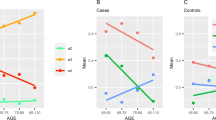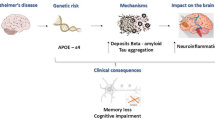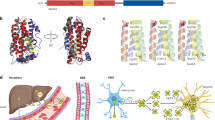Abstract
The single nucleotide polymorphisms (SNPs) rs449647, rs769446 and rs405509 in the promoter region of the APOE gene have been variously suggested to be ɛ4-independent risk factors for Alzheimer's disease (AD). A previous Italian study found that the rs449647 was significantly associated with late-onset AD. The aim of this study was to verify whether these APOE promoter SNPs are genetic risk factors for AD and to investigate their interaction with the common APOE polymorphism. A total of 169 clinically diagnosed AD patients and 99 cognitively intact age-matched controls were included in the study. Significant associations with AD independent from sex, age and APOE/ɛ4 status were found for rs449647 A/A and rs405509 G/G genotypes (positive), and rs449647 A/T and rs405509 T/T genotypes (negative). Haplotype frequency estimation at the APOE locus showed significant associations for the ATG4, ATT4 and ACG3 (positive) and ATT2, ATT3 and TCG3 (negative) haplotypes. Therefore this study confirms the role of the rs449647 A/A genotype as risk factor for AD in Italy and suggests that promoter genotypes and APOE haplotypes might have a complex function in AD-associated genetic risk factors.
Similar content being viewed by others
Log in or create a free account to read this content
Gain free access to this article, as well as selected content from this journal and more on nature.com
or
References
St George-Hyslop PH, Petit A : Molecular biology and genetics of Alzheimer's disease. C R Biol 2005; 328: 119–130.
Zawia NH, Basha MR : Environmental risk factors and the developmental basis for Alzheimer's disease. Rev Neurosci 2005; 16: 325–337.
American College of Medical Genetics/American Society of Human Genetics Working Group on ApoE and Alzheimer Disease: Statement on use of apolipoprotein E testing for Alzheimer disease. JAMA 1995; 274: 1627–1629.
National Institute on Aging/Alzheimer's Association Working Group: Apolipoprotein E genotyping in Alzheimer's disease. Lancet 1996; 347: 1091–1095.
Artiga MJ, Bullido MJ, Sastre I et al: Allelic polymorphisms in the transcriptional regulatory region of apolipoprotein E gene. FEBS Lett 1998; 421: 105–108.
Bullido MJ, Valdivieso F : Apolipoprotein E gene promoter polymorphisms in Alzheimer's disease. Microsc Res Tech 2000; 50: 261–267.
Alvarez-Arcaya A, Combarros O, Llorca J, Sanchez-Guerra M, Berciano J, Fernandez-Luna JL : The −491 TT apolipoprotein E promoter polymorphism is associated with reduced risk for sporadic Alzheimer's disease. Neurosci Lett 2001; 304: 204–208.
Bray NJ, Jehu L, Moskvina V et al: Allelic expression of APOE in human brain: effects of epsilon status and promoter haplotypes. Hum Mol Genet 2004; 13: 2885–2892.
Lambert JC, Berr C, Pasquier F et al: Pronounced impact of Th1/E47cs mutation compared with −491 AT mutation on neural APOE gene expression and risk of developing Alzheimer's disease. Hum Mol Genet 1998; 7: 1511–1516.
Laws SM, Hone E, Gandy S, Martins RN : Expanding the association between the APOE gene and the risk of Alzheimer's disease: possible roles for APOE promoter polymorphisms and alterations in APOE transcription. J Neurochem 2003; 84: 1215–1236.
Artiga MJ, Bullido MJ, Frank A et al: Risk for Alzheimer's disease correlates with transcriptional activity of the APOE gene. Hum Mol Genet 1998; 7: 1887–1892.
Casadei VM, Ferri C, Veglia F et al: APOE −491 promoter polymorphism is a risk factor for late-onset Alzheimer's disease. Neurology 1999; 53: 1888–1889.
Wang JC, Kwon JM, Shah P, Morris JC, Goate A : Effect of APOE genotype and promoter polymorphism on risk of Alzheimer's disease. Neurology 2000; 55: 1644–1649.
Seripa D, Signori E, Gravina C, Matera MG, Rinaldi M, Fazio VM : Simple and effective determination of apolipoprotein E genotypes by positive/negative polymerase chain reaction products. Diagn Mol Path 2006; 15: 180–185.
Gerdes LA, Klausen IB, Sihm I, Færgeman O : Apolipoprotein E polymorphism in a Danish population compared to findings in 45 other study populations around the world. Genet Epidemiol 1992; 9: 155–167.
Leandro G, Duca P : The role of hepatitis B and C viruses in hepatocellular carcinoma in a hepatitis B endemic area: a case–control study. Cancer 1993; 71: 510–511.
Stephens M, Smith N, Donnelly P : A new statistical method for haplotype reconstruction from population data. Am J Hum Genet 2001; 68: 978–989.
Stephens M, Donnelly P : A comparison of Bayesian methods for haplotype reconstruction from population genotype data. Am J Hum Genet 2003; 73: 1162–1169.
Seripa D, Matera MG, Daniele A et al: The missing ApoE allele. Ann Hum Genet 2007; 71: 496–500.
Ahmed ARH, MacGowan SH, Culpan D, Jones RW, Wilcock GK : The −491 A/T polymorphism of the apolipoprotein E gene is associated with the ApoEe4 allele and Alzheimer's disease. Neurosci Lett 1999; 263: 217–219.
Lambert JC, Mann D, Goumidi L et al: Effect of the APOE promoter polymorphisms on cerebral amyloid peptide deposition in Alzheimer's disease. Lancet 2001; 357: 608–609.
Lambert JC, Pasquier F, Cottel D, Frigard B, Amouyel P, Chartier-Harlin MC : A new polymorphism in the APOE promoter associated with risk of developing Alzheimer's disease. Hum Mol Genet 1998; 7: 533–540.
Nicodemus KK, Stenger JE, Schmechel DE et al: Comprehensive association analysis of APOE regulatory region polymorphisms in Alzheimer disease. Neurogenetics 2004; 5: 201–208.
Roks G, Cruts M, Houwing-Duistermaat JJ et al: Effect of the APOE −491A/T promoter polymorphism on apolipoprotein E levels and risk of Alzheimer disease: the Rotterdam Study. Am J Med Genet 2002; 114: 570–573.
Yang JD, Feng GY, Zhang J, Cheung J, St Clair D, He L : Apolipoprotein E −491 promoter polymorphism is an independent risk factor for Alzheimer's disease in the Chinese population. Neurosci Lett 2003; 350: 25–28.
Lambert JC, Araria-Goumidi L, Myllykangas L et al: Contribution of APOE promoter polymorphisms to Alzheimer's disease risk. Neurology 2002; 59: 59–66.
Helisalmi S, Hiltunen M, Valonen P et al: Promoter polymorphism (−491 A/T) in the APOE gene of Finnish Alzheimer's disease patients and control individuals. J Neurol 1999; 246: 821–824.
Song YQ, Rogaeva E, Premkumar S et al: Absence of association between Alzheimer disease and the −491 regulatory region polymorphism of APOE. Neuroscience Lett 1998; 250: 189–192.
Toji H, Maruyama H, Sasaki K, Nakamura S, Kawakami H : Apolipoprotein E promoter polymorphism and sporadic Alzheimer's disease in a Japanese population. Neurosci Lett 1999; 259: 56–58.
Laws SM, Hone E, Taddei K et al: Variation at the APOE −491 promoter locus is associated with altered brain levels of apolipoprotein E. Mol Psychiatry 2002; 7: 886–890.
Laws SM, Taddei K, Martins G et al: The −491 AA polymorphism in the APOE gene is associated with increased plasma apoE levels in Alzheimer's disease. Neuroreport 1999; 10: 879–882.
Pahnke J, Walker LC, Schroeder E et al: Cerebral beta-amyloid deposition is augmented by the –491 AA promoter polymorphism in non-demented elderly individuals bearing the apolipoprotein E ɛ4 allele. Acta Neuropathol 2003; 105: 25–29.
Holtzman DM, Bales KR, Tenkova T et al: Apolipoprotein E isoform-dependent amyloid deposition and neuritic degeneration in a mouse model of Alzheimer's disease. Proc Natl Acad Sci USA 2000; 97: 2892–2897.
Holtzman DM, Bales KR, Wu S et al: Expression of human apolipoprotein E reduces amyloid-beta deposition in a mouse model of Alzheimer's disease. J Clin Invest 1999; 103: R15–R21.
Zurutuza L, Verpillat P, Raux G et al: APOE promoter polymorphisms do not confer independent risk for Alzheimer's disease in a French population. Eur J Hum Genet 2000; 8: 713–716.
Myllykangas L, Polvikoski T, Reunanen K et al: ApoE e3-haplotype modulates Alzheimer beta-amyloid deposition in the brain. Am J Med Genet 2002; 114: 288–291.
Heijmans BT, Slagboom PE, Gussekloo J et al: Association of APOE varepsilon2/varepsilon3/varepsilon4 and promoter gene variants with dementia but not cardiovascular mortality in old age. Am J Med Genet 2002; 107: 201–208.
Lambert JC, Berr C, Cottel D, Amouyel P, Helbecque N : APOE promoter polymorphisms and dementia in the elderly. Neurosci Lett 2004; 365: 116–119.
Town T, Paris D, Fallin D et al: The –491A/T apolipoprotein E promoter polymorphism association with Alzheimer's disease: independent risk and linkage disequilibrium with the known APOE polymorphism. Neurosci Lett 1998; 252: 95–98.
Parra-Bonilla G, Arboleda G, Yunis J et al: Haplogroup analysis of the risk associated with APOE promoter polymorphism (−219T/G, −491A/T and –427T/C) in Colombian Alzheimer's disease patients. Neurosci Lett 2003; 349: 159–162.
Acknowledgements
This study was partially supported by a grant from the Italian Ministry of Health (4AN/F9-2003-06) to CM and IRCCS Research Program, Ricerca Corrente 2006-2008, Linea n. 2 ‘Malattie di rilevanza sociale’.
Author information
Authors and Affiliations
Corresponding author
Rights and permissions
About this article
Cite this article
Bizzarro, A., Seripa, D., Acciarri, A. et al. The complex interaction between APOE promoter and AD: an Italian case–control study. Eur J Hum Genet 17, 938–945 (2009). https://doi.org/10.1038/ejhg.2008.263
Received:
Revised:
Accepted:
Published:
Issue date:
DOI: https://doi.org/10.1038/ejhg.2008.263
Keywords
This article is cited by
-
Effects of the association between APOE rs405509 polymorphisms and gene-environment interactions on hand grip strength among middle-aged and elderly people in a rural population in southern China
Journal of Orthopaedic Surgery and Research (2021)
-
Influence of genetic polymorphisms in homocysteine and lipid metabolism systems on antidepressant drug response
BMC Psychiatry (2020)
-
Apolipoprotein E promoter genotypes are not associated with white matter hyperintensity development in high-altitude careers
BMC Research Notes (2019)
-
Prognostic significance of factor XIIIA promoter methylation status in aneurysmal subarachnoid haemorrhage (aSAH)
BMC Cardiovascular Disorders (2019)
-
The algorithm for Alzheimer risk assessment based on APOE promoter polymorphisms
Alzheimer's Research & Therapy (2016)



